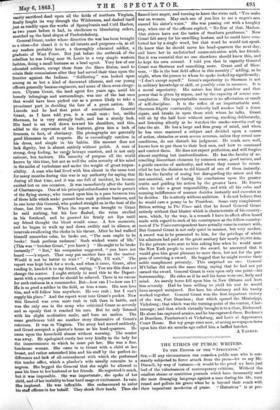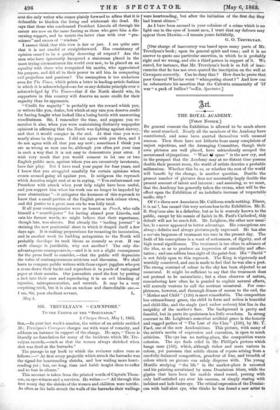THE ETHICS OF PUBLIC WRITERS.
To THE EDITOR OF THE "SPECTATOR."
Sin,—If any circumstance can console a public man who is con- stantly subjected to fierce attack from the press—let us say Mr. Disraeli, by way of instance—it would be the proof we have just had of the valuelessness of contemporary criticism. Without the smallest shame or contrition journals which have incessantly used the most damaging language against a man during his life, turn round and pollute his grave when he is beyond their reach with their impenitent mockeries of praise. " Historicus " is at pre- sent the only writer who comes plainly forward to affirm that it is defensible to blacken the living and whitewash the dead. He says that those who condemned President Lincoln all through his career are now on the same footing as those who gave him a dis- cerning support, and he taunts the latter class with over "pre- science" and excess of "wisdom."
I cannot think that this view is fair or just. I am quite sure that it is not candid or straightforward. Has consistency of opinion ceased to be a quality deserving of respect ? Are the men who have ignorantly hampered a statesman placed in the most trying circumstances the world ever saw, to be placed on an equality with those who recognized his merits, who appreciated his purpose, and did all in their power to aid him in conquering evil prejudices and passions ? The assumption is too audacious even for The Times, which prints a letter in leading-article fashion in which it is acknowledged—so far as any definite principle ever is acknowledged by The Times—that if the North should win, its supporters in this country will deserve no more credit for their sagacity than its opponents.
"Credit for sagacity" is probably not the reward which you, or writers like you, desire, but which at any rate you deserve credit for having fought what looked like a losing battle with unswerving steadfastness. Sir, I remember the time, and ,suppose you re- member it also, when you were maintaining distinctly unpopular opinions in affirming that the North was fighting against slavery, and that it would conquer in the end. At that time you were nearly alone in the press. I did not agree with you then, and I do not agree with all that you say now ; sometimes I think you are as wrong as men can be, although you often put your case in such a way that it is not easy to demonstrate your error. I wish very much that you would consent to let one or two English public men, against whom you are excessively inveterate, have fair play. But I have read your paper for four years, and I know that you struggled manfully for certain opinions when events seemed going all against you, It mitigates the reproach which America might cast at us in saying, "You embarrassed our President with attack when your help might have been useful, and you support him when his work can no longer be impeded by your obstructions "—it mitigates the keenness of this reproach to know that a small portion of the English press took calmer views, and did justice to a great man ere he was fully tried.
If all your contemporaries were as honest as Punch, who calls himself a " scurril-jester " for having abused poor Lincoln, and eats his former words, we might believe that their repentance, though late, was sincere. But already the "leading journal" is staining the new penitential sheet in which it draped itself a few days ago. It is making preparations for recanting its incantation, and in another week its budding antagonism to the North will probably develope its rank bloom as coarsely as ever. If one swift change is justifiable, why not another? The only dis- advantageous consequence is,—and it is not a slight consequence for the press itself to consider, —that the public will depreciate the value of contemporaneous criticism and discussion. We shall learn to compare public writers with those expert jugglers who put a stone down their backs and reproduce it in yards of variegated paper at their mouths. Our journalists excel the feat by putting a fact into their ears and reproducing it in an evil blending of injustice, misrepresentation, and untruth. It may be a very surprising trick, but it is also an unclean and discreditable one.—































 Previous page
Previous page